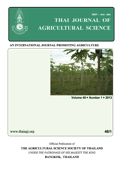Effect of Wheat Cultivars and Berseem Clover as Cover Crop on Melilotus Alba Growth
Main Article Content
Abstract
Melilotus alba is an exotic weed that infests wheat fields in northern Iran. In two field experiments in Qrakhyl Agronomy Research Station, Iran, the influence of two weed cultural management on the reduction in M. alba effect on wheat performance was investigated. In experiment one, the effect of 9 wheat cultivar competitiveness with natural population of M. alba was investigated in 2010. In experiment two, the effect of wheat planting distances and berseem clover (Trifolium alexanderinum) seeding rate on M. alba growth was evaluated in 2011. Morvarid cultivar was significantly taller than the other ones. M. alba presence reduced the yield of wheat cultivars. A variation in cultivars in reducing M. alba density and biomass were observed. Morvarid suppressed M. alba successfully. Results from experiment two showed that interaction between wheat planting distances and berseem clover density had no significant effect on height, tiller number, economical and biological yield and harvest index of wheat. Enhancement of berseem clover seeding rate reduced wheat yield and density and dry matter alfalfa. Results suggest that among the wheat cultivars did not observe any variations in competition with M. alba. However, berseem clover seeding rate (6/25 kgha-1) was significantly reduced through M. alba density and biomass and maintained wheat yield.


